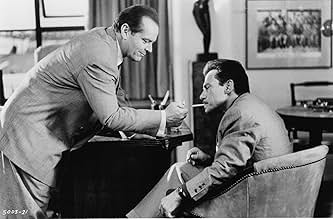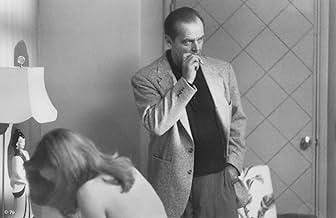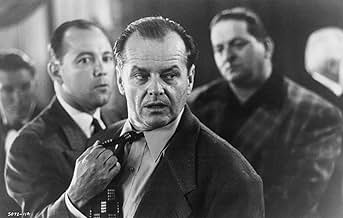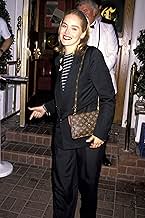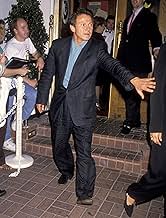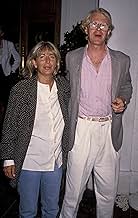IMDb-BEWERTUNG
6,1/10
16.365
IHRE BEWERTUNG
Die Fortsetzung von Chinatown (1974) findet J.J. "Jake" Gittes, der Ehebruch und Mord untersucht, und das Geld, das aus Öl stammt.Die Fortsetzung von Chinatown (1974) findet J.J. "Jake" Gittes, der Ehebruch und Mord untersucht, und das Geld, das aus Öl stammt.Die Fortsetzung von Chinatown (1974) findet J.J. "Jake" Gittes, der Ehebruch und Mord untersucht, und das Geld, das aus Öl stammt.
Empfohlene Bewertungen
The Two Jakes has the misfortune of following an absolutely exceptional original in Chinatown. Few sequels live up the original and one can only wonder at how different, and presumably better it would have been if Polanski had directed again. This is not a bad movie.It was nice to see the character of Jake Gittes again. It does have its moments of private eye noir and intrigue. Jack Nicholson and Harvey Keitel are always fascinating to watch. Some of the action and word play is really enjoyable. Unfortunately it has no rhythm. The plot is long winded, confused and tentative. On too many occasion's I felt my interest waning. However I decided to see it through and felt the pace gather a bit towards the end. The acting is good and there's enough in it to keep it fairly interesting, but at times I felt like I was just hanging in there watching and hoping for it to become great, which it never does. If someone asked me to explain what happened in the film I think I would actually struggle to make sense of it. Nicholson and Keitel make it watchable, but not memorable. It's not not great because Chinatown was so good. It's just not great full stop. It was an average sequel. Not the first and certainly won't be the last...
The Two Jakes and The Godfather 3 were released in the second half of 1990 and both films proved that sometimes it's best not to tamper with classics. This is not necessarily because sometimes a sequel can't compliment a classic, but because no matter what you do, there's no way to avoid comparing the new versions to the old. And the final chapter of the Godfather trilogy is vastly inferior to the first two. And Two Jakes is vastly inferior to Chinatown. But since Chinatown and the first two Godfathers are among the best films every made, that's a pretty pointless comparison. Just as The Godfather 3 stands on its own as a very sturdy and interesting piece of filmmaking, Two Jakes also works on its own merits. It's confusing, overlong (a full ten minutes more than the original), and never fully gels, but it's also passionate, intelligent filmmaking. Go figure.
In his autobiography, producer Robert Evans refers to Robert Towne's script for Two Jakes as basically only half-finished. It was half-finished when they started shooting, half-finished when they made it half-way through the shoot, and it pretty much feels half-finished in the final product. This is a movie where characters wander in and out and a full two-thirds of the storylines go essentially unresolved. The grand climax of the film (and trust me, I'm not spoiling anything) is an evidentiary hearing, for heavens sakes! And I couldn't really explain the plot if I wanted to, but here's the quick summary: It's fifteen years after Chinatown and Jake Gittes Jack Nicholson) has become older, fatter, and a good deal more bitter. He's now an Investigator respected throughout LA, but he's still haunted by his experiences with the Mulwrays, especially the late Evelyn. The film begins with a jealous husband, Jake Berman (Harvey Keitel), storming into a hotel room and killing his wife's lover, with Jake listening in the next room. Of course, you know the crime probably wasn't entirely about love or lust and that money probably had something to do with it. Money, history, and oil, actually. And it spins in circles from there.
It's easy to notice that the film slacks off at around the half-way point. It's then that you realize just how tight Robert Towne's Chinatown script was. Even at a shred over two hours, every word counts, every gesture, every twist. Two Jakes is flabby in comparison. The dialogue is pleasantly hardboiled and the actors enjoy delivering it, but the resolutions of the various mysteries mostly fall flat. You either see them coming, or don't understand when they arrive. It's to Towne and director Jack Nicholson's credit that the film ends on a number of satisfying grace notes.
Nicholson's direction is almost never the source of the film's flaws. And this is legitimately high praise in a film as twisting and convoluted as this. Of course, he again makes you appreciate the brilliant economy of Roman Polanski's direction of Chinatown, a film with an immeasurable amount of class. Nicholson produces several wonderful moments including a beautiful pull shot from the ocean to a teatime conversation with Kahn (who Chinatown fans will avidly remember). Nicholson and director of photography Vilmos Zsigmond capture a Los Angeles of burnt out dreams, on the brink of overdevelopment and overexpansion. The film has noir stylings but it respectfully looks different from Chinatown.
Nicholson's performance is more a study of what has happened to the actor since Chinatown, rather than what has happened to the character. Because Jack was less of an icon when Chinatown was made, the original Jake Gittes is one of his least iconic performances. By the time he won his Oscar the next year for One Flew Over The Cuckoo's nest Nicholson had already become JACK (in all caps) and he hasn't looked back. In Two Jakes, Jake Gittes has become JACK. There's no getting around it. However, there's also no getting around the fact that Nicholson is a great actor and even if his performances are frequently variations on a theme, it's a pretty super theme.
Two Jakes is peppered with supporting performances of varying degrees of depth. Harvey Keitel has never been better as the second of the two Jakes. His character is emotionally complicated and perhaps the only person in the film (besides Gittes) who gets to go through a character arc. He plays it wonderfully. The femmes fatale in the film, as played by Madeline Stowe and Meg Tilly are less and more complicated than they seem. Ruben Blade, Richard Farnsworth, and Eli Wallach provide capable support when they're given anything to do.
The fact is that like the Godfather 3, if you came upon Two Jakes with a completely open mind, you'd find it a complicated thriller, vastly more substantial than most films of the genre. The fact that it's got its flaws that it'll never compare to Chinatown are the basis for a 7/10 rating.
In his autobiography, producer Robert Evans refers to Robert Towne's script for Two Jakes as basically only half-finished. It was half-finished when they started shooting, half-finished when they made it half-way through the shoot, and it pretty much feels half-finished in the final product. This is a movie where characters wander in and out and a full two-thirds of the storylines go essentially unresolved. The grand climax of the film (and trust me, I'm not spoiling anything) is an evidentiary hearing, for heavens sakes! And I couldn't really explain the plot if I wanted to, but here's the quick summary: It's fifteen years after Chinatown and Jake Gittes Jack Nicholson) has become older, fatter, and a good deal more bitter. He's now an Investigator respected throughout LA, but he's still haunted by his experiences with the Mulwrays, especially the late Evelyn. The film begins with a jealous husband, Jake Berman (Harvey Keitel), storming into a hotel room and killing his wife's lover, with Jake listening in the next room. Of course, you know the crime probably wasn't entirely about love or lust and that money probably had something to do with it. Money, history, and oil, actually. And it spins in circles from there.
It's easy to notice that the film slacks off at around the half-way point. It's then that you realize just how tight Robert Towne's Chinatown script was. Even at a shred over two hours, every word counts, every gesture, every twist. Two Jakes is flabby in comparison. The dialogue is pleasantly hardboiled and the actors enjoy delivering it, but the resolutions of the various mysteries mostly fall flat. You either see them coming, or don't understand when they arrive. It's to Towne and director Jack Nicholson's credit that the film ends on a number of satisfying grace notes.
Nicholson's direction is almost never the source of the film's flaws. And this is legitimately high praise in a film as twisting and convoluted as this. Of course, he again makes you appreciate the brilliant economy of Roman Polanski's direction of Chinatown, a film with an immeasurable amount of class. Nicholson produces several wonderful moments including a beautiful pull shot from the ocean to a teatime conversation with Kahn (who Chinatown fans will avidly remember). Nicholson and director of photography Vilmos Zsigmond capture a Los Angeles of burnt out dreams, on the brink of overdevelopment and overexpansion. The film has noir stylings but it respectfully looks different from Chinatown.
Nicholson's performance is more a study of what has happened to the actor since Chinatown, rather than what has happened to the character. Because Jack was less of an icon when Chinatown was made, the original Jake Gittes is one of his least iconic performances. By the time he won his Oscar the next year for One Flew Over The Cuckoo's nest Nicholson had already become JACK (in all caps) and he hasn't looked back. In Two Jakes, Jake Gittes has become JACK. There's no getting around it. However, there's also no getting around the fact that Nicholson is a great actor and even if his performances are frequently variations on a theme, it's a pretty super theme.
Two Jakes is peppered with supporting performances of varying degrees of depth. Harvey Keitel has never been better as the second of the two Jakes. His character is emotionally complicated and perhaps the only person in the film (besides Gittes) who gets to go through a character arc. He plays it wonderfully. The femmes fatale in the film, as played by Madeline Stowe and Meg Tilly are less and more complicated than they seem. Ruben Blade, Richard Farnsworth, and Eli Wallach provide capable support when they're given anything to do.
The fact is that like the Godfather 3, if you came upon Two Jakes with a completely open mind, you'd find it a complicated thriller, vastly more substantial than most films of the genre. The fact that it's got its flaws that it'll never compare to Chinatown are the basis for a 7/10 rating.
Most reviews pull The Two Jakes to pieces, except for a very well-considered one by Roger Ebert (find it at the Chicago Sun-Times).
Of course, it's not the classic Chinatown is, but it's a damned good movie. It's about the past, how it pervades our lives for the rest of our days, and how we assimilate it into our futures.
Many have complained that the film is convoluted, that when the key revelation comes (I ain't givin' that away) you miss the impact of it. I strongly disagree with this. I for one had actually figured out the revelation before it happened - this didn't bother me because I wanted so much for it to be what I had thought it was going to be. And when it comes, it's so subtle you could almost be forgiven for missing it. It's lovely, so comforting in a very ironic way.
All I'll say is, pay attention to the scene where Jake (Nicholson) goes to see Kahn (the unmistakable James Hong). Something about the flowers...
Anyway, I'm drifting. The Two Jakes is subtle, well-crafted, and when all is revealed, so very simple. The 'convoluted' events in the plot serve to illustrate what a single, simple desire can cause.
Just watch it. Bear in mind the events and characters from Chinatown, but only so that you have a back story for these characters and not a standard to which they should be compared.
Of course, it's not the classic Chinatown is, but it's a damned good movie. It's about the past, how it pervades our lives for the rest of our days, and how we assimilate it into our futures.
Many have complained that the film is convoluted, that when the key revelation comes (I ain't givin' that away) you miss the impact of it. I strongly disagree with this. I for one had actually figured out the revelation before it happened - this didn't bother me because I wanted so much for it to be what I had thought it was going to be. And when it comes, it's so subtle you could almost be forgiven for missing it. It's lovely, so comforting in a very ironic way.
All I'll say is, pay attention to the scene where Jake (Nicholson) goes to see Kahn (the unmistakable James Hong). Something about the flowers...
Anyway, I'm drifting. The Two Jakes is subtle, well-crafted, and when all is revealed, so very simple. The 'convoluted' events in the plot serve to illustrate what a single, simple desire can cause.
Just watch it. Bear in mind the events and characters from Chinatown, but only so that you have a back story for these characters and not a standard to which they should be compared.
Being a "sequel" to "Chinatown," I had high expectations of this film. I even gave it two looks - one on VHS and then one a few years later on DVD - because I wanted so much to like it....but it stunk each time. What a waste of money.
The only thing going for it is the beautiful film-work and the great 1940s atmosphere, as "Chinatown" had some 16 years earlier when that film came out. (Kind of long wait for a sequel, anyway, don't you think?)
If ever a movie could be called "convoluted," it's this one. It made Chinatown as simple as "Bambi." Even the mainline critics all agreed this was incoherent in its storytelling. It's less confusing, but not much, if you know the characters from Chinatown since there are references to "Kathryn Mulray." However, it's just too frustrating to watch and try to follow what's going on.
I know lots of people who loved "Chinatown" but not one who likes this film.
The only thing going for it is the beautiful film-work and the great 1940s atmosphere, as "Chinatown" had some 16 years earlier when that film came out. (Kind of long wait for a sequel, anyway, don't you think?)
If ever a movie could be called "convoluted," it's this one. It made Chinatown as simple as "Bambi." Even the mainline critics all agreed this was incoherent in its storytelling. It's less confusing, but not much, if you know the characters from Chinatown since there are references to "Kathryn Mulray." However, it's just too frustrating to watch and try to follow what's going on.
I know lots of people who loved "Chinatown" but not one who likes this film.
I currently live in the place that the plot of this movie centers around. The post war San Fernando Valley(yes, that Valley where the Valley Girl phenomenon originated) that exploded with development after WWII. Before the war the valley was largely orange and walnut groves and before the big boom, the government built many Defense plants here to build and develop most of it's planes. To accommodate the many employees of these plants, housing developers moved in and there were many power grabs of which these 2 movies revolve around. After the infusion of the water that was brought in via the Mullholland Dam Project (part of the plot of Chinatown) the population of the Valley grew in leaps and bounds! What was a pleasant drive in the "country" as Los Angeleans referred to the SFV as, before the late 40's, became the largest housing boom the country has ever seen before or since! Currently there are at least 3 million people living here(many undocumented immigrants live here uncounted). Anyone who owned land became wealthy including the late Bob Hope who owned vast amounts of Valley acreage! Many of the farmers from back then ( like Van Owen and Van nuys) sold thier land and became very rich. I think that the John Huston character from Chinatown was based on one of the Van characters. They even named major avenues in the Valley after Van Nuys and Van Owen. I think that the actual filming of the movie was shot north of the San Fernando Valley because it is all developed now. I am too young to remember the era of this movie but i can appreciate since I live in LA and can see many of the buildings seen in the Hollywood and downtown scenes that still stand and look just like they did then! I loved this movie for the many ways it captured the era. One scene where Jake is driving you can hear on the radio the serial "The Whistler", which is still played among others on the Oldtime Radio Hour, on a local AM station 1070. True, this town isn't as old or historical as a Boston or New York or Philadelphia, but it has had it's moments and it's moods are reflected well in this movie. If you don't at first understand the plot, maybe it isn't as complex as it may seem. It's about a part of our country that exploded with growth and opportunities perhaps like none other and of course there will be visionary people trying to capitalize on that and make a fortune.
Wusstest du schon
- WissenswertesAt a movie theatre in Florida a patron left his seat to tell the theater manager that the reels of the movie were running out of sequence. The manager went to check and confirmed this, but then told the moviegoer "this movie's been playing here for three weeks and you're the first person who noticed that something was wrong."
- PatzerJake tells Ralph when they are standing in front of the laundry if he got dimes for phone calls. In 1948, the cost of a payphone was five cents. It didn't go to 10 cents until 1951.
- Zitate
Jake Gittes: What I do for a living may not be very reputable... but I am. In this town I'm the leper with the most fingers.
- Alternative VersionenFor the 2007 DVD release, Jack Nicholson had some of the narration and the music cues removed. He also supervised a color correction.
- VerbindungenEdited from Chinatown (1974)
Top-Auswahl
Melde dich zum Bewerten an und greife auf die Watchlist für personalisierte Empfehlungen zu.
- How long is The Two Jakes?Powered by Alexa
Details
- Erscheinungsdatum
- Herkunftsland
- Sprachen
- Auch bekannt als
- Barrio chino 2
- Drehorte
- 5608 S Soto St., Huntington Park, Kalifornien, USA(J.J. 'Jake' Gittes office)
- Produktionsfirmen
- Weitere beteiligte Unternehmen bei IMDbPro anzeigen
Box Office
- Budget
- 19.000.000 $ (geschätzt)
- Bruttoertrag in den USA und Kanada
- 10.005.969 $
- Eröffnungswochenende in den USA und in Kanada
- 3.729.149 $
- 12. Aug. 1990
- Weltweiter Bruttoertrag
- 10.005.969 $
- Laufzeit
- 2 Std. 17 Min.(137 min)
- Farbe
- Seitenverhältnis
- 1.85 : 1
Zu dieser Seite beitragen
Bearbeitung vorschlagen oder fehlenden Inhalt hinzufügen


